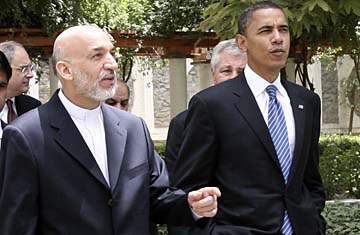
Barack Obama walks with Afghan President Hamid Karzai at the Presidential Palace in Kabul, Sunday, July 20, 2008.
The presumptive Democratic presidential nominee Senator Barack Obama started his second day in Afghanistan in a thoroughly American manner: a breakfast of bacon and eggs. He dined with American troops on a military base in the capital, Kabul, with his congressional traveling companions, Senators Chuck Hagel and Jack Reed. As they ate they were joined by soldiers from their respective states — Illinois, Nebraska and Rhode Island — for convivial conversations about what was going on in Afghanistan, life back at home, and the presidential campaign. "The food was good, but the companionship and friendship was even better," says Lt. Col. David Johnson, a public affairs officer who attended the event.
Obama was visiting Afghanistan as part of a multi-stop tour through the Middle East and Europe that is calculated in part to bolster his foreign policy credentials. He will also be stopping in Baghdad, which will be the Senator's second visit to Iraq. Obama started his visit to Afghanistan with a briefing at Bagram Air force Base on Saturday, followed by a quick helicopter trip to the eastern province of Nangahar where he met with the provincial governor. He returned to Kabul in the evening and stayed the night at the U.S. embassy. In an interview aired Sunday morning on CBS's Face the Nation, Obama called the situation in Afghanistan "precarious" and "urgent," and stressed that Washington needs to start planning now to send more troops to the country rather than leaving that to the next President. He also took the opportunity to complain that neighboring Pakistan is not doing enough to go after militant training camps in its remote tribal areas.
Back on the ground in Afghanistan, breakfast with the troops was one of his favorite parts, Obama told a military reporter at the event, according to CNN. "To see young people like this, who are doing such excellent work with so much dedication and pride, it makes you feel good about the country," he said. "You want to make sure that everybody back home understands how much pride people take in their work here and how much sacrifice people are making. It's outstanding."
The delegation went on to a briefing at NATO's military headquarters in the capital, followed up by lunch with Afghan President Hamid Karzai. Over a traditional meal of mutton baked with rice, carrots and raisins, Karzai and the Senators spoke on a broad range of issues, according to presidential spokesman Humayun Hamidzada. "The discussions focused on significant progress we have made, but also on the unmet challenges that are still ahead of us."
During his stay, Obama would have gotten a taste of some of those issues — on the first night of his visit a misunderstanding between Coalition forces, the Afghan National Army and the Afghan National Police led to an air strike in western Afghanistan that killed eight police and injured six, according to Khalilulah Rahmani, Police chief of Farah Province. "It was an unfortunate incident of friendly fire," says Hamidzada, who explained at a press conference that Afghan soldiers traveling with U.S. forces had mistaken the police for Taliban militants and asked for air support.
And in the country's southeast two mortar rounds fired by NATO-led troops at militants fell a kilometer short and killed four civilians, according to a report released by the International Security Assistance Force. Over the past few weeks President Karzai has vigorously protested such events of civilian casualties — on July 6 NATO forces bombed a wedding party in southeastern Afghanistan by mistake, killing 47. But today's lunch was neither the time nor the place to focus on civilian casualties, says Hamidzada, pointing out that the Senator's visit was more of an introduction to the country, and that such specific policy issues should be reserved for U.S. leaders. "It is Afghan tradition to welcome visitors and focus on the positive," he said.
Obama, too, may have faced some trepidation before the meeting with Karzai. On July 11 Obama questioned Karzai's leadership in an interview with CNN, saying, "I think the Karzai government has not gotten out of the bunker and helped to organize Afghanistan and [the] government, the judiciary, police forces, in ways that would give people confidence." At the time the Afghan government reacted angrily to the comment, but now that the President and the presidential hopeful have met, the tensions seem to have eased. "We didn't see it as criticism per se, because there is a degree of realism in that," says Hamidzada. "We are facing a significant threat of terrorism, and the reality is we are spending resources on that. Our hope is to minimize threat of terrorism so that we can focus on reconstruction and development of Afghanistan."
That's something everyone, including Karzai, Obama and even his opponent John McCain, can agree on.
